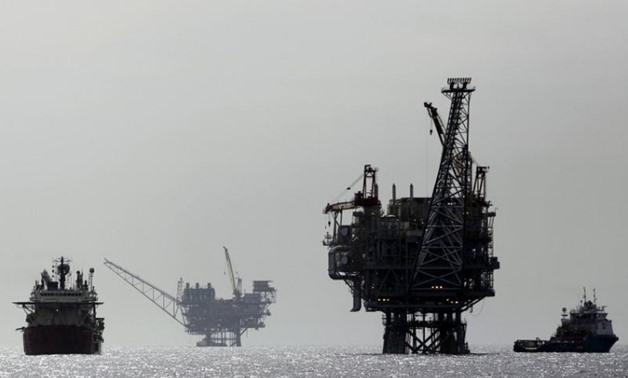
An Israeli gas platform, controlled by a U.S.-Israeli energy group, is seen some 24 km west of Israel's port city of Ashdod on Feb. 25, 2013. REUTERS/Amir Cohen
CAIRO – 19 February 2018: Agreements signed by the government or the private sector to import gas from eastern Mediterranean countries strengthens its position against Turkish ambitions to control the sector in the region, an energy expert told Egypt Today on Monday.
Around 64 BCM of natural gas from Israel’s Tamar and Leviathan reservoirs will be exported to private Egyptian company Dolphinus over a decade for $15 billion, according to a Monday statement by Delek Drilling, one of the two companies leading gas projects in reservoirs. Egypt has another agreement with Cyprus to transmit gas from Cypriot gas-filled Aphrodite to the Egyptian coast.
Cairo has thus won the competition with Ankara over the sources of gas in the eastern Mediterranean, while Egypt continues to consolidate its alliance with Greece, Cyprus and the region at large, said Medhat Youssef, former head of the Egyptian General Petroleum Corporation.
Such deals accelerate Egypt’s plan to be transformed into a regional energy hub. Meanwhile, the government is not committed in the short or long terms per the agreement, as Dolphinus will import the gas to use in privately-owned factories or to liquefy and re-export, according to Youssef.
“The export deals establish Egypt’s status as a regional energy center, which allows the supply of gas both to the Egyptian domestic market and for export,” said Yossi Abu, CEO of Delek Drilling.
“Concurrently with the implementation of the transactions, we are continuing to promote additional agreements,” Abu added in the Delek Drilling statement.
On Feb. 13, the Egyptian cabinet issued the executive statute of a law issued in September 2017 to regulate the gas market, allowing private companies to operate in the field. The agreement awaits prerequisite regulatory and government approvals in both countries, according to the contract. The gas price will be based on a price formula linked to the Brent oil barrel prices.
In the Mediterranean, the Egyptian-Cypriot alliance is the strongest of its kind in the region, because the two countries have large gas reservoirs, and it is also friendly with the European Union, which wants to secure its needs for gas away from Russian domination, Youssef emphasized.
The location of Egypt on the map, its infrastructure, and recent gas discoveries make the country “pivotal” in connecting the Cypriot and Greek gas with the Egyptian liquefaction plants, he said.
When a gas pipeline is established between Cyprus and Greece from one side to Egypt on the other side, Egypt will be the sole center for the disposal of eastern Mediterranean gas to Europe or any other place in the world via the Egyptian liquefaction stations, the petroleum expert added.
Egypt is planned to acquire self-sufficiency in gas in 2018 with the Zohr gas field and other fields in the Egyptian Mediterranean and the Delta, and turn into a major exporter of its own.
The means of supply from Israel to Egypt is still being studied; hence, the date of transmission has not yet been determined. Possible options are the East Mediterranean Gas Company’s pipeline from Arish to Ashkelon, which has repeatedly been attacked, and the Jordanian-Israeli pipeline.
However, the agreement stipulates that the supply will continue until 2030, or until the 64 BCM have been fulfilled, whichever is sooner.
Additional reporting by Hanan Fayed


Comments
Leave a Comment